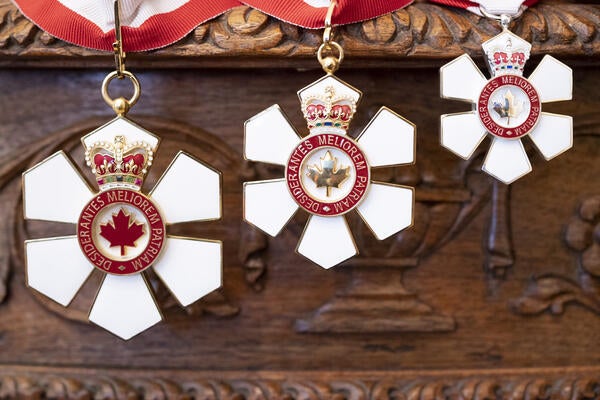
Four Waterloo professors named Royal Society of Canada fellows
Four professors from the University of Waterloo are among the new fellows of the Royal Society of Canada (RSC) announced today, peer-elected as the best in their field

Four professors from the University of Waterloo are among the new fellows of the Royal Society of Canada (RSC) announced today, peer-elected as the best in their field
By Media RelationsFour professors from the University of Waterloo are among the new fellows of the Royal Society of Canada (RSC) announced today, peer-elected as the best in their field.
The fellowship of the RSC consists of individuals who have made outstanding contributions in the arts, the humanities, science, and Canadian public life.
"Waterloo attracts many of the best research talent from across the globe, and the selection of these four individuals as fellows of the Royal Society of Canada is further evidence of their excellent work in particular," said Feridun Hamdullahpur, president and vice-chancellor of Waterloo. "It is groundbreaking research like theirs that will help Waterloo achieve its goal of becoming one of the top innovation universities internationally, tackling some of the most complex issues in the world. I congratulate all of them on this important recognition."
The University of Waterloo's newest Royal Society fellows are as follows:
Philippe Van Cappellen, Department of Earth and Environmental Sciences, Faculty of Science
David Cory, Institute for Quantum Computing, Department of Chemistry, Department of Physics and Astronomy, Faculty of Science
Eric Helleiner, Department of Political Science, Faculty of Arts
Xuemin Shen, Department of Electrical and Computer Engineering, Faculty of Engineering
The RSC names about 80 new fellows annually. This year's induction ceremony will take place on November 27 in Victoria.
The primary objective of the RSC is to promote learning and research in the arts, the humanities and the natural and social sciences. To learn more about the Royal Society of Canada, please visit the website.

Read more
The Government of Canada announces funding to support research in food policies and medical devices

Insignia for Companion, Officer and Member of the Order of Canada. (Photo credit: Sgt Johanie Maheu, Rideau Hall © OSGG, 2019.)
Read more
Alumni and honorary alumni recognized for shaping Canada’s health, policy, justice and financial sectors

Read more
Here are the people and events behind some of this year’s most compelling Waterloo stories
The University of Waterloo acknowledges that much of our work takes place on the traditional territory of the Neutral, Anishinaabeg, and Haudenosaunee peoples. Our main campus is situated on the Haldimand Tract, the land granted to the Six Nations that includes six miles on each side of the Grand River. Our active work toward reconciliation takes place across our campuses through research, learning, teaching, and community building, and is co-ordinated within the Office of Indigenous Relations.